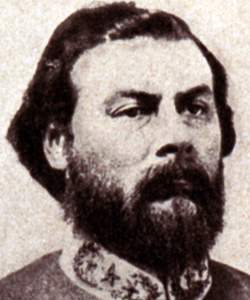Junius Daniel (National Cyclopaedia)
Reference
DANIEL, Junius, soldier, was born in Halifax county, N.C., June 27, 1828. His father, John Rivers Jones Daniel, was attorney-general of North Carolina (1834-41), a member of congress (1841-51), and a cousin of J.J. Daniel, a justice of the supreme court. Junius was graduated at West Point after having experienced severe injuries in artillery practice in 1851. He was sent to Kentucky, but left there in 1852, and spent the next four years in forts Albuquerque, Fillmore, and Stanton, and in Indian fighting. Here he was an ardent student of the art of war. He resigned his commission in 1857, and took charge of his father’s large estates in Louisiana. He was commissioned colonel of the 4th, afterward the 14th, North Carolina regiment, C.S.A., June 3, 1861….He was made a brigadier general, Sept. 2, 1862, and was given command of the 32nd, 43d, 45th, 53, and 2d battalions North Carolina troops; and there was, at the time of his appointment, no officer of his grade more distinguished for his soldierly qualities, and none so particularly gifted as an organizer and disciplinarian....was with Rodes’s division at Gettysburg, and the ability to handle soldiers displayed here won him high praise. He continued with the army of northern Virginia, was wounded at Spottsylvania Court House, May 12, 1864, and died of his wounds the next day.
"Daniel, Junius," The National Cyclopaedia of American Biography (New York: James T. White & Company, 1897), 7: 127.
Junius Daniel (Notable Americans)
Reference
DANIEL, Junius, soldier, was born in Halifax county. N.C., June 27, 1828; son of John Reeve Jones Daniel. He was graduated from the U.S. military academy in 1851 and served on garrison duty in Kentucky and Missouri, 1851-52; and on frontier duty and scouting in New Mexico, I853-56. He was promoted first lieutenant May 31, 1857, and was on sick leave of absence, 1856-58. He resigned from the army Jan. 14, 1858, and became a planter in Shreveport, La. In 1861 he joined the Confederate army as colonel and was the organizer and commander of several brigades. He was promoted brigadier-general Sept. 2, 1862, and was placed in command of five battalions of North Carolina troops operating on the James river. In May, 1863, he was transferred to General Lee's army and fought at Gettysburg, Wilderness and Spottsylvania. On May 12, 1864, lie was wounded at the "bloody angle" in the battle of Spottsylvania, Va., and died May 13, 1864.
Rossiter Johnson, ed., “ Daniel, Junius,” The Twentieth Century Biographical Dictionary of Notable Americans, vol. 3 (Boston: The Biographical Society, 1904).
Junius Daniel (Allen, 1918)
Reference
When Lincoln called for troops to crush the South, the State of Louisiana offered Daniel a commission in the service of that State. He, however, preferred to serve with the troops of North Carolina and hastened home. Arriving in Halifax, he tendered his services to Governor Ellis, and was immediately accepted. He was shortly afterwards elected Colonel of the Fourth Regiment, but later of the Fourteenth, which he accepted and remained the commanding officer until the period of enlistment expired. He was then tendered command of the Forty-Third and the Forty-Fifth regiments, which had enlisted for the period of the war...
At Carlisle, Pa., General Ewell conferred a great honor upon General Daniel and his brigade. After reaching that place, General Ewell made a speech to Rode's division, complimenting them upon the successes of the march, their military bearing, and soldierly conduct. Then turning to Daniel's brigade, recently attached to the division, he said: "You have shown yourselves so obedient to all orders, so sturdy and regular on the march and so well disciplined, that I will intrust to you the bearing of the 'Corps flag,' confident that its honor could never suffer while in the keeping of such troops."
This was a proud moment for General Daniel and the highest compliment that could have been conferred on his troops. The older brigades murmured at this preference, but the flag was valiantly borne in many hard fought battles. General Ramseur said that he coveted that flag and that he never saw troops move with more precision on parade than the troops who bore it when ordered to change their position under the full fire of the enemy. This tribute came from an honored rival and could not have been meant for mere pleasantry.
At Carlisle, Pa., General Ewell conferred a great honor upon General Daniel and his brigade. After reaching that place, General Ewell made a speech to Rode's division, complimenting them upon the successes of the march, their military bearing, and soldierly conduct. Then turning to Daniel's brigade, recently attached to the division, he said: "You have shown yourselves so obedient to all orders, so sturdy and regular on the march and so well disciplined, that I will intrust to you the bearing of the 'Corps flag,' confident that its honor could never suffer while in the keeping of such troops."
This was a proud moment for General Daniel and the highest compliment that could have been conferred on his troops. The older brigades murmured at this preference, but the flag was valiantly borne in many hard fought battles. General Ramseur said that he coveted that flag and that he never saw troops move with more precision on parade than the troops who bore it when ordered to change their position under the full fire of the enemy. This tribute came from an honored rival and could not have been meant for mere pleasantry.
W. C. Allen, History of Halifax County (Boston: The Cornhill Company, 1918), 197-199.



